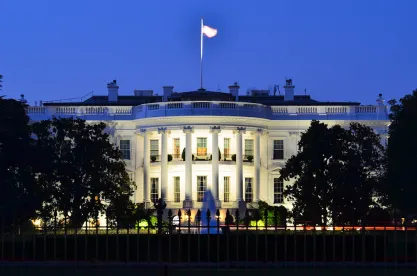Implementation of Bipartisan Infrastructure Law
The Biden Administration has created a new website (www.build.gov) focused on implementation of the Infrastructure Investment and Jobs Act – now commonly referred to as the Bipartisan Infrastructure Law (BIL).
A fact sheet on BIL competitive funding opportunities for local governments can be found HERE. It includes opportunities for Transportation; Climate, Energy & Environment; and Broadband, Cyber & Other Programs. Relative to energy and sustainability, key opportunities include:
-
Charging & Fueling Infrastructure Grants – Funded at $2.5 billion, this discretionary grant program is in addition to a $5 billion formula grant program for the States and will support the strategic deployment of publicly accessible electric vehicle charging infrastructure, as well as hydrogen, propane, and natural gas fueling infrastructure, along designated alternative fuel corridors and in communities.
-
Clean School Bus Program – A $5 billion competitive grant program to replace existing school buses with low- or zero-emission school buses.
-
Energy Efficiency and Conservation Block Grants – This block grant program will provide $550 million to states, local governments, and tribes for projects that reduce energy use, increase energy efficiency, and cut pollution.
-
Grants for Energy Efficiency in Schools - $500 million for local government education agencies and nonprofit partners to make energy efficiency, renewable energy, and clean vehicle upgrades and improvements at public schools.
-
Grants for Energy Efficiency and Resilience Code Adoption – State energy agencies, in partnership with local code agencies, codes and standards developers, utilities, and other entities, are eligible for $225 million in funding to enable sustained, cost-effective, implementation of updated building energy codes.
-
Regional Clean Hydrogen Hubs – $8 billion to support the development of at least four regional clean hydrogen hubs to improve clean hydrogen production, processing, delivery, storage, and end use.
-
Smart Grid Investment Grant Program and Energy Sector Operational Support for Cyber Resilience Program – Two programs providing $3 billion and $50 million respectively for electric utilities to modernize the electricity grid and increase resilience to cyber threats.
The Department of Energy has created a webpage dedicated to the 60 new BIL programs to be stood up over the next five years including 16 demonstration and 32 deployment programs, and expanded funding for 12 existing Research, Development, Demonstration, and Deployment (RDD&D) programs.
Build Back Better Act
With the Build Back Better Act (BBB), President Biden’s $1.8 trillion bill focused on climate change and social policy, having failed to advance in the Senate after passing the House, negotiations continue on a scaled back version of the proposal. Some moderate Democrats have proposed breaking the bill up into separate legislative vehicles that might be able to pass the evenly divided Senate, with President Biden endorsing this approach. Speaker Pelosi, however, has noted that it would remain difficult to get past the Senate filibuster even on proposals that have some level of bipartisan support. She has conceded that Democrats will likely need to find consensus on a scaled back version of the BBB that could pass the Senate via reconciliation (a simple majority vote) by securing the support of Sens. Manchin (D-WV) and Sinema (D-AZ) whose lack of support doomed the more expansive BBB last month. Giving some hope for supporters of the measure, Sen. Manchin, chairman of the Senate Energy Committee, has signaled his support for many of the clean tech and environmental provisions in the BBB. A new, smaller version of the BBB would likely be in the range of $1 trillion to $1.5 trillion and would probably also be renamed. With the president set to deliver the State of the Union address to Congress on March 1, there is an informal goal of having at least the framework of a new agreement by then.
White House Launches Building Codes Coalition
The White House announced it is partnering with states, cities, labor, and industry to launch the Building Performance Standards Coalition, a first-of-its-kind partnership between 33 state and local governments dedicated to delivering cleaner, healthier, and more affordable buildings. Read more HERE.
Building a Better Grid Initiative
On January 12, 2022, the Department of Energy launched the “Building a Better Grid” Initiative to catalyze the nationwide development of new and upgraded high-capacity electric transmission lines. The initiative will work with community and industry stakeholders to identify national transmission needs and support the buildout of long-distance, high voltage transmission facilities that are critical to reaching President Biden’s goal of 100% clean electricity by 2035 and a zero emissions economy by 2050. A Federal Register Notice of Intent with additional details can be found HERE.
New Office of Clean Energy Demonstrations at DOE
Established by the BIL, the Department of Energy’s new Office of Clean Energy Demonstrations is funded at $20 billion to support clean energy technology demonstration projects in areas including clean hydrogen, carbon capture, grid-scale energy storage, small modular reactors, and more. According to DOE, the office “will consistently engage environmental justice groups, labor, and communities to help shape program development and execution. In addition to the large-scale projects, DOE will continue to support many smaller-scale pilots and demonstrations that are needed to meet the Administration’s climate goals.” Click HERE to read more.
Senate Energy Nominations Hearing
On February 3 the Senate Energy & Natural Resources Committee will meet to consider a number of nominations:
-
Ms. Maria D. Robinson to be an Assistant Secretary of Energy (Office of Electricity);
-
Dr. Joseph F. DeCarolis to be Administrator of the Energy Information Administration; and
-
Ms. Laura Daniel-Davis to be an Assistant Secretary of the Interior (Land and Minerals Management).




 />i
/>i
